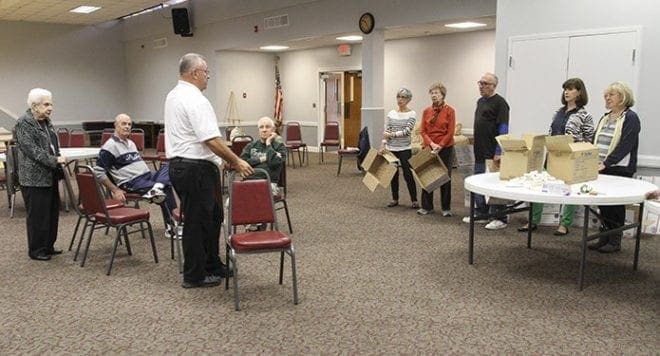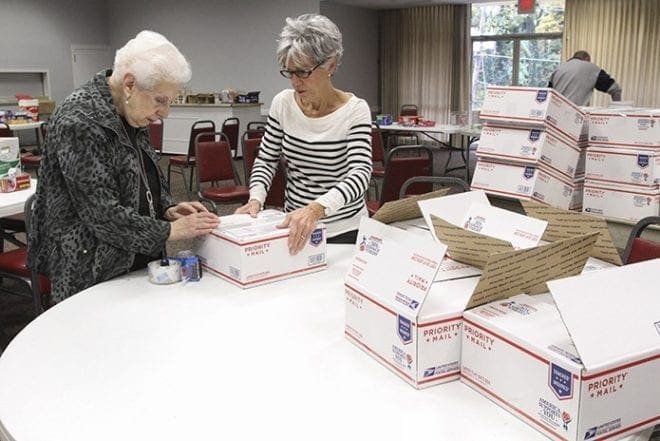(L-r) Holy Cross Church parishioners Jim Towhey, Denis Clos, Lou Hightower, Jane Miller, Bob DeSantis and Patricia Krull file through a line of food and snack items packing their individual boxes. Since the Troop Support Ministry’s inception, over 2,600 care boxes have been sent to deployed service members. Photo By Michael Alexander
Atlanta
Holy Cross Troop Support Ministry is year-round lifeline of prayer, care packages
By ANDREW NELSON, Staff Writer | Published November 12, 2015
ATLANTA—Stacked boxes against the wall are addressed to destinations as far from Atlanta as Afghanistan and Kuwait and as near as Fort Gordon, outside Augusta. Tucked in them are snacks to be devoured by GIs, like Cracker Jacks, instant grits and Starburst candy. Among these reminders of home is a package the size of a deck of cards. The patriotically colored wrapping encloses a crucifix. A typed note says the people of Holy Cross Church are praying for the recipient.
“Each box is like packing for my own child,” said Carol Waindle. “You want everything in the box to be just so.”
The Waindles are one of the Blue Star families active in the ministry. These parents, who have one of their own on active duty, serve with prayers and worries deep in their hearts.
Over the years, nearly 2,600 care boxes have been shipped by the Holy Cross Troop Support Ministry to boost the morale of women and men who wear military uniforms. The suburban Atlanta parish is designated as a military-friendly place. At Masses near Veterans Day, more than five-dozen former soldiers, sailors and airmen were to enter the church ahead of clergy and be recognized.
Bob Spidel, 65, a 30-year Army veteran, knows the importance of these wrapped reminders of home. A Georgia native, Spidel specialized in tank warfare and served in conflicts in Iraq and Desert Storm, the first Gulf war to stem the invasion of Kuwait. Now a retired Army colonel, he recalled opening a package addressed to “any solider.” That was in early 1991.
“It was to any soldier, but it was from the Brown family in Oregon. I wrote them a thank you note. I have never seen them in my life, but we communicate every Christmas with cards,” Spidel said.
Parish support turns one-time effort into ministry
In 2008, some Holy Cross parishioners organized a one-time mailing of care packages. However, the parish embraced it. Spidel and parishioner Eleanor Camarata got the ministry off the ground. They started with nine names, which quickly grew to 100 and then the names of 1,000 service members.
The ministry wanted to focus efforts on troops with a Georgia connection, either a parish member, a neighbor, or a Georgia unit. Faith affiliation was never important as the ministry never asked. Catholics make up about 25 percent of all troops.
“The letters get to me. I sit and cry because they are so heartfelt. It helps them to realize they are not forgotten,” said Camarata, wearing a red blouse and silver earrings.
Troop deployments have been reduced in recent years, but the ministry hasn’t slowed. Boxes are now shipped to USO centers in the Middle East and Asia, which are visited monthly by more than 20,000 troops.

Bob Spidel, third from the left, gives some instructions to the group before they actually start packing care boxes for the troops. Spidel and Eleanor Camarata, far left, head up Holy Cross Church’s Troop Support Ministry, which began in October 2008. Photo By Michael Alexander
The ministry collects donations monthly, sometimes as much as $1,500. The group turns the church hall into an assembly line of boxes of snack foods and personal hygiene items. At one time, toilet paper was one of its most valued packaged items. Said Spidel, “On the remote sites, that was one of the hardest things to find.”
From the donations, about $500 is set aside for a charity Spidel gives a “thorough scrub” to ensure it supports veterans’ needs. The ministry donates care packages 11 months out of the year, and, for Christmas, the ministry writes larger checks to the Fisher House, which provides lodging for veterans and their families getting medical care, the Intrepid Fallen Heroes Fund, the Air Force Aid Society and other similar charities.
Blue Star parents treat the ministry with extra care
Many of the ministry volunteers remember their own time in the military before their hair turned white. But it’s the Blue Star parents whose hearts get packed into every box. The ministry has a special hold on them. They know these small items are going to women and men like their kids.
The Blue Star tradition dates to World War I. Parents with sons (and now daughters) in the military displayed small flags in their windows. A blue star designated each family member in the military service. A gold star represented a family member who died while on duty. (A recent movement is trying to introduce a silver star to represent a family member severely injured during military service.)
Christi Seifring’s oldest son, Brian Brennan, has served for close to a dozen years, with tours in Iraq and Afghanistan. Military service is in his DNA. He comes from a line of military men and women, including his grandfather who served in the Navy, his uncle and a female cousin in the Army. His late father, buried at Arlington National Cemetery, piloted Army helicopters.
Seifring thinks about her son, his friend killed in action, Tyler Brown, and all of the families who are sacrificing.
“I actually pray for them all the time. I’m proud of anyone who is willing to put on a uniform to protect and defend us,” she said.
“My worldview expanded when he went in. I continue to track where our service members are in harm’s way,” said Seifring, who serves in the ministry with her husband, Bob.
Faith has shaped Seifring during her time as a military wife and now as a mother of a service member.

Eleanor Camarata, left, and Barbara Kerner tape the boxes shut once the packing crew has filled them. Photo By Michael Alexander
“It gives me gratitude when I see our troops coming home safe and when I see my grandchildren with both their parents at home. It gives me hope when civilian, military and veteran clinicians and faith communities step up to support our troops, veterans and their families. It helps me know that there are no accidents, but a plan that is emerging. Going with the plan takes much less energy than resisting and giving up believing,” she said.
Seifring, a retired psychologist, helps veterans in a mental health clinic at Fort Gordon. She helped design a program for troops that assesses their well-being, not just “mind-body” but “mind-body-heart-spirit.”
She stressed how important faith communities can be to GIs being discharged. In the military, the chaplain is one of the few people GIs can turn to without professional repercussions. That trust in the faith community is key to helping them transition to civilian life after serving in combat or overseas, she said.
“They are looking for a place to land. They may shop for a church where they feel welcome,” Seifring said.
Waindle’s son, Frank, an Army veteran, served in Iraq. He, too, has military service in his family tree, with a grandfather who served in World War II and his father, also Frank, serving after attending the U.S. Naval Academy. The younger Waindle was baptized at Holy Cross Church and was part of an ROTC program in high school. He worked as an Army combat engineer and is now a member of the Army Reserves.
“I was very proud. I was also very scared for him,” his mother said. “Every day you thought of nothing but him. Faith is always a big part of everyone’s life. Faith is a big, big part. I’d be anywhere and just start praying.”
During the dark days, when the news reported roadside bombs and other mayhem, Waindle leaned on her faith in addition to her job as a preschool teacher.
“They distract you. They need your full attention. They are filled with joy,” she said about the youngsters. They kept her spirits up and also kept her grounded. When kids rely on you for everything, you cannot get too distracted, she said.
The faith community was and is vital to military families, she said.
“You definitely leaned on your faith. There were a lot of candles lit. Everybody was very supportive.”